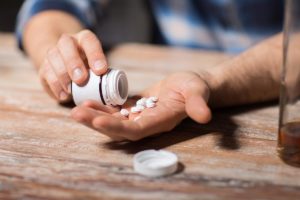Clinicians use many terms to describe benzodiazepine addiction, such as anxiolytic, hypnotic, or sedative use disorder. No matter which term is used, all treatments for this substance use disorder (SUD) start with a benzo detox program.
The development of a benzo addiction may not be obvious to the person struggling with it or their loved ones, but signs of it will start to be observable as the addiction takes hold of their life. Addiction has a way of disrupting relationships, responsibilities, and routines. This disruption is typically why most people struggling with addiction seek to overcome it with professional help. Looking for a benzo detox program in California? Contact DetoxLA today by calling 818.616.7341 or reaching out to our team online.
What Are Benzodiazepines?
Benzodiazepines are central nervous system (CNS) depressant drugs that slow down the messages that travel between the brain and the body. Benzos and other depressant drugs don’t necessarily make a person feel depressed. Other depressants include alcohol, cannabis, and opioids.
Benzodiazepines can also be called anxiolytics, hypnotics, sedatives, or tranquilizers. Physicians typically prescribe them to relieve anxiety and stress or help patients sleep better. However, most benzo prescriptions are for short-term use because there are risks to using benzos for a long time—including chemical dependency that quickly leads to addiction.
What Are the Benefits of Getting Admitted Into a Benzo Detox Center?
1. Avoiding Benzo Withdrawal Symptoms
A wide range of benzo withdrawal symptoms can arise during the detox process, including the following:
- Agitation and restlessness
- Anxiety and panic
- Dizziness
- Fatigue
- Feelings of unreality
- Flushing
- Gastrointestinal (GI) problems
- Hallucinations
- Headaches
- Muscle cramps and pain
- Seizures
- Shortness of breath
- Sleep problems
- Sweating
- Tremors
Did you know that even using benzos for three to four weeks under the supervision of a doctor can lead to withdrawal symptoms once the doses stop? Even people who use them for medical purposes may need professional help to deal with withdrawal symptoms that can be very severe in frequency or intensity.
The United States Food and Drug Administration (FDA) has approved two prescription medications — buprenorphine and methadone — for patients needing medication-assisted treatment (MAT) to help them undergo detox from benzos. While these drugs can’t actually help patients avoid withdrawal symptoms, they can reduce their frequency and intensity and make patients more comfortable and able to focus completely on their addiction recovery.
Apart from or in combination with MAT, a benzo detox program can use the tapering method to help patients cleanse their bodies of benzos. For some patients, quitting benzos suddenly can cause dangerous withdrawal symptoms, so they must be put on tapering schedules that gradually eliminate benzos from their bodies.
2. Avoiding Fatal Overdoses
A benzo detox program can treat patients who overdose. Not all patients like this are diagnosed with benzo addiction, though. A benzo overdose can be intentional in suicidal patients or accidental when benzos are used with other CNS depressants. Older adults, who commonly have diminished drug clearance and take multiple maintenance medications, are at an especially high risk of accidentally overdosing.
- A benzodiazepine overdose can lead to the following consequences:
- Confusion and difficulty thinking
- Coma
- Extreme sedation or drowsiness
- Loss of muscle control
- Slurred speech
- Very low breathing rate
An overdose like this can be fatal, especially if the patient combines benzos with alcohol or opioids. In general, anyone who shows signs of a benzo overdose or an adverse reaction to the drug should seek emergency medical help at a nearby benzo detox center or at medical facilities that offer urgent care or emergency services.
3. Avoiding Potentially Life-Threatening Health Consequences
Benzodiazepine misuse should always be a cause for concern. These drugs should never be used for recreational purposes or without the supervision of a healthcare professional. Long-term benzo misuse can lead to health consequences that can shorten someone’s expected lifespan. Some of the damage from benzo addiction on the body and the mind could be permanent and irreversible.
Effects of long-term benzo misuse may include disinhibition, impaired concentration and memory, and sexual dysfunction. It may also have a similar effect on the brain as alcohol addiction. Benzo abuse may lead to or complicate diagnoses of anxiety, depression, post-traumatic stress disorder (PTSD), sleep disorders, and neurocognitive disorders.
A benzo detox program cleanses patients’ bodies. It provides them with a clean slate upon which they can start to live a sober life and avoid undesirable health consequences.
When Should You Consider a Benzo Detox Program?
If you or someone you care about is struggling with benzo addiction, you should consider seeking professional help and starting on the path to addiction recovery at a benzo detox center.
Quitting benzos by going cold turkey isn’t recommended by rehab specialists. Instead, it’s generally ideal to begin a benzo detox process through tapering. Quitting suddenly can shock a patient’s system and lead to more intense withdrawal symptoms. A benzo detox program will help patients keep a tapering schedule and will also likely offer MAT for cases that need it.
Learn More About DetoxLA’s Benzo Detox Program
If you’re searching for a benzo detox program in California, contact DetoxLA today. Call 818.616.7341 or reach out to our team online.





